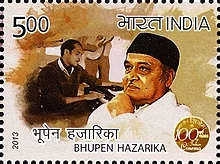.webp)
Daulat Rahman/Guwahati
For a man who penned and sang immortal, patriotic lines such as “Mor Aik bhaal pao bulile anor Aik jano gheen korato bujabo? (If I love my mother does it mean I hate that of others?),” Bhupen Hazarika was afraid of what might happen to Assam and its people.
“The fragmentation of Assam scares me, I’m afraid the Assamese will not last as a people,” the music maestro told me in an interview in the first part of 2011 when I was working for The Telegraph. “We must learn to live together: the old and the new, the old Assamese and the new, the old Muslim and the new, all communities, be they tribal or others.”
“Mor bhoi lage (I am scared) the Assamese as a race will become extinct one day. So, we have to remain united,” Hazarika said.
Hazarika had been with his people all along — as a poet, journalist, singer, lyricist, musician, filmmaker, writer, and politician. For the people of Assam in particular and Northeast in general, Bhupen Hazarika fondly called Bhupendra was more than a mere artiste. He would always remain in their imagination as a guide and guardian of their destiny.
The strong bond, which he shared with the masses, had its roots more than half a century ago. The singer had resigned from his job at Guwahati University and his wife Priyam had left him. Penury stared him in the face.

Postal ticket in honour of Bhupen Hazarika
Without any fixed income, in order to make ends meet, Bhupen Hazarika and his brother Jayanta started traveling to different parts of Assam. Both brothers sang at functions and concerts to entertain people in cities, towns, and also in the remotest hamlets. During that phase of his life, Bhupenda first came into direct and intimate contact with the people and touched their hearts, minds, and souls.
All songs of Bhupendra were about the constant struggle of the ordinary man to survive. He had a vision or dreamt of a classless society where there would be no discrimination between rich and poor. He also imagined a society without exploitation and injustice, where people of different faiths and religions, would live in ideal harmony. In articulating the innermost desires of the people through lyrics, Bhupendra became a voice of the masses. He was also called the Bard of Brahmaputra.
The people of Assam informally gave the title of ganashilpi — the people’s artiste to Bhupendra. The singer had never betrayed the expectations of the people and always rose to the occasion. Almost all the momentous developments in Assam and other parts of the North East in the second half of the 20th century, such as the Chinese aggression, the building of the Saraighat bridge, language disturbances, and the Assam movement against illegal infiltration, find an echo in Bhupenda's lyrics.
For example, during the linguistic conflict of 1960, when the people of Assam agitated for Assamese to be made the official language, it was Bhupendra’s song (Manuhe Manuhor Babe) composed for the moment which contributed to preventing the movement from sliding into chaos.
ALSO READ: How relations between India's top Parsi business families soured?
In 2011 Bhupen Hazarika had left us. But the overwhelming impact of the ideals preached through his music has been seminal on the Assamese society, which makes him almost irreplaceable.
